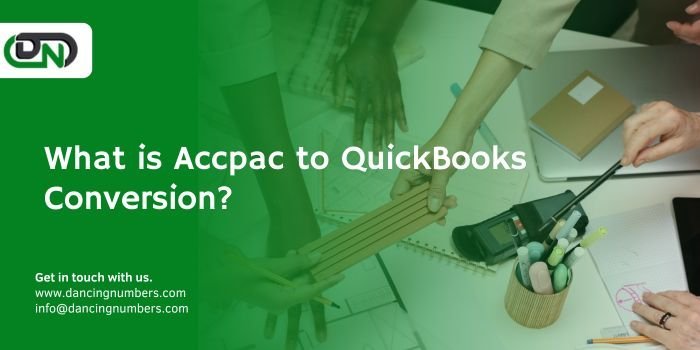What is Accpac to QuickBooks Conversion?
This article delves into what Accpac to QuickBooks conversion entails, the reasons behind this transition, the steps involved, and the benefits it offers.

In the dynamic world of business, effective accounting solutions are crucial for maintaining financial health and ensuring smooth operations. As businesses evolve, so do their needs for more efficient, user-friendly, and robust accounting software. A common transition seen in many small to mid-sized businesses is the migration from Sage Accpac (now known as Sage 300) to QuickBooks. This article delves into what Accpac to QuickBooks conversion entails, the reasons behind this transition, the steps involved, and the benefits it offers.
Understanding Accpac and QuickBooks
Accpac (Sage 300):
Sage 300, formerly known as Sage Accpac, is a comprehensive ERP (Enterprise Resource Planning) software designed for small to medium-sized businesses. It offers extensive functionality, including financial management, inventory control, project management, and customer relationship management (CRM). Accpac is known for its powerful features and flexibility, making it suitable for complex business processes.
QuickBooks:
QuickBooks, developed by Intuit, is one of the most popular accounting software solutions, particularly among small businesses. It offers a range of products, including QuickBooks Online and QuickBooks Desktop, designed to simplify financial management tasks such as invoicing, payroll, expense tracking, and tax preparation. QuickBooks is celebrated for its ease of use, affordability, and strong customer support.
Why Businesses Migrate from Accpac to QuickBooks
- User-Friendly Interface: QuickBooks is known for its intuitive and easy-to-navigate interface, which significantly reduces the learning curve for new users. This contrasts with Accpac, which, while powerful, can be complex and requires more specialized knowledge to operate efficiently.
- Cost-Effectiveness: QuickBooks is generally more affordable than Sage 300, both in terms of initial purchase and ongoing maintenance costs. For many small businesses, this cost difference can be a significant factor.
- Scalability: QuickBooks offers scalable solutions that can grow with a business. As a business expands, it can easily upgrade to more advanced versions or add more users and functionalities.
- Cloud Accessibility: QuickBooks Online allows users to access their financial data from anywhere with an internet connection, providing greater flexibility and supporting remote work environments. While Sage 300 also offers cloud solutions, QuickBooks’ cloud-based offerings are often seen as more straightforward and cost-effective.
- Integration and Add-Ons: QuickBooks integrates seamlessly with a wide array of third-party applications, enhancing its functionality. This integration capability can streamline operations by connecting QuickBooks with CRM systems, e-commerce platforms, and other business tools.
Steps Involved in Accpac to QuickBooks Conversion
- Planning and Assessment: The first step in the conversion process is to thoroughly assess the current system and plan the migration. This includes identifying the data to be migrated, such as customer and vendor information, financial records, inventory details, and transactional data.
- Data Backup: Before any QuickBooks data migration, it is critical to back up the existing data in Accpac. This ensures that in case of any issues during the conversion process, the original data remains intact and recoverable.
- Data Extraction: Data extraction involves pulling out the necessary data from Accpac. This can be done using built-in export functions or specialized data extraction tools. The data is typically exported into a format compatible with QuickBooks, such as CSV (Comma-Separated Values) files.
- Data Mapping: Data mapping is the process of matching the extracted data fields from Accpac to the corresponding fields in QuickBooks. This step ensures that the data is correctly interpreted and placed in the appropriate locations within the new system.
- Data Import into QuickBooks: Once the data is mapped, it is imported into QuickBooks. This can be done using QuickBooks’ import functions or through third-party migration tools specifically designed for this purpose.
- Validation and Testing: After the data import, it is essential to validate and test the data to ensure accuracy. This involves checking balances, running financial reports, and comparing them with the original reports from Accpac to ensure consistency.
- Training and Support: Training employees on the new system is crucial for a smooth transition. Providing adequate support during the initial stages of using QuickBooks helps in addressing any issues or concerns promptly.
- Go-Live and Monitoring: Once everything is in place, the business can officially switch to QuickBooks. Continuous monitoring during the initial period is vital to catch any discrepancies or issues early and address them swiftly.
Benefits of Accpac to QuickBooks Conversion
- Enhanced Efficiency: QuickBooks’ user-friendly interface and automation capabilities can significantly enhance the efficiency of financial management tasks. This allows businesses to focus more on strategic activities rather than mundane accounting tasks.
- Cost Savings: By switching to QuickBooks, businesses can reduce their software costs, including lower licensing fees and reduced IT maintenance expenses.
- Improved Decision Making: QuickBooks provides robust reporting features that help business owners make informed decisions based on real-time financial data.
- Better Cash Flow Management: QuickBooks offers advanced tools for tracking income and expenses, helping businesses manage their cash flow more effectively.
- Regulatory Compliance: QuickBooks is regularly updated to comply with the latest accounting standards and tax regulations, ensuring that businesses remain compliant with minimal effort.
- Flexibility and Accessibility: The ability to access financial data from anywhere enhances operational flexibility, especially for businesses with remote teams or multiple locations.
- Integration Capabilities: The extensive integration options available with QuickBooks help streamline business processes by connecting various systems and applications.
- Scalability: As a business grows, QuickBooks can easily be scaled to accommodate more complex accounting needs, ensuring that the software remains useful over the long term.
Conclusion
Migrating data from Accpac to QuickBooks is a strategic decision for many small to mid-sized businesses looking for a more cost-effective, user-friendly, and flexible accounting solution. While the conversion process involves several steps, careful planning and execution can ensure a smooth transition. The benefits of using QuickBooks, including enhanced efficiency, cost savings, and improved decision-making capabilities, make it a compelling choice for businesses aiming to optimize their financial management. Whether driven by the need for better integration, cloud accessibility, or simply a more intuitive interface, moving to QuickBooks can provide the tools necessary for businesses to thrive in a competitive environment.
What's Your Reaction?











![Wireless Connectivity Software Market Size, Share | Statistics [2032]](https://handyclassified.com/uploads/images/202404/image_100x75_661f3be896033.jpg)



